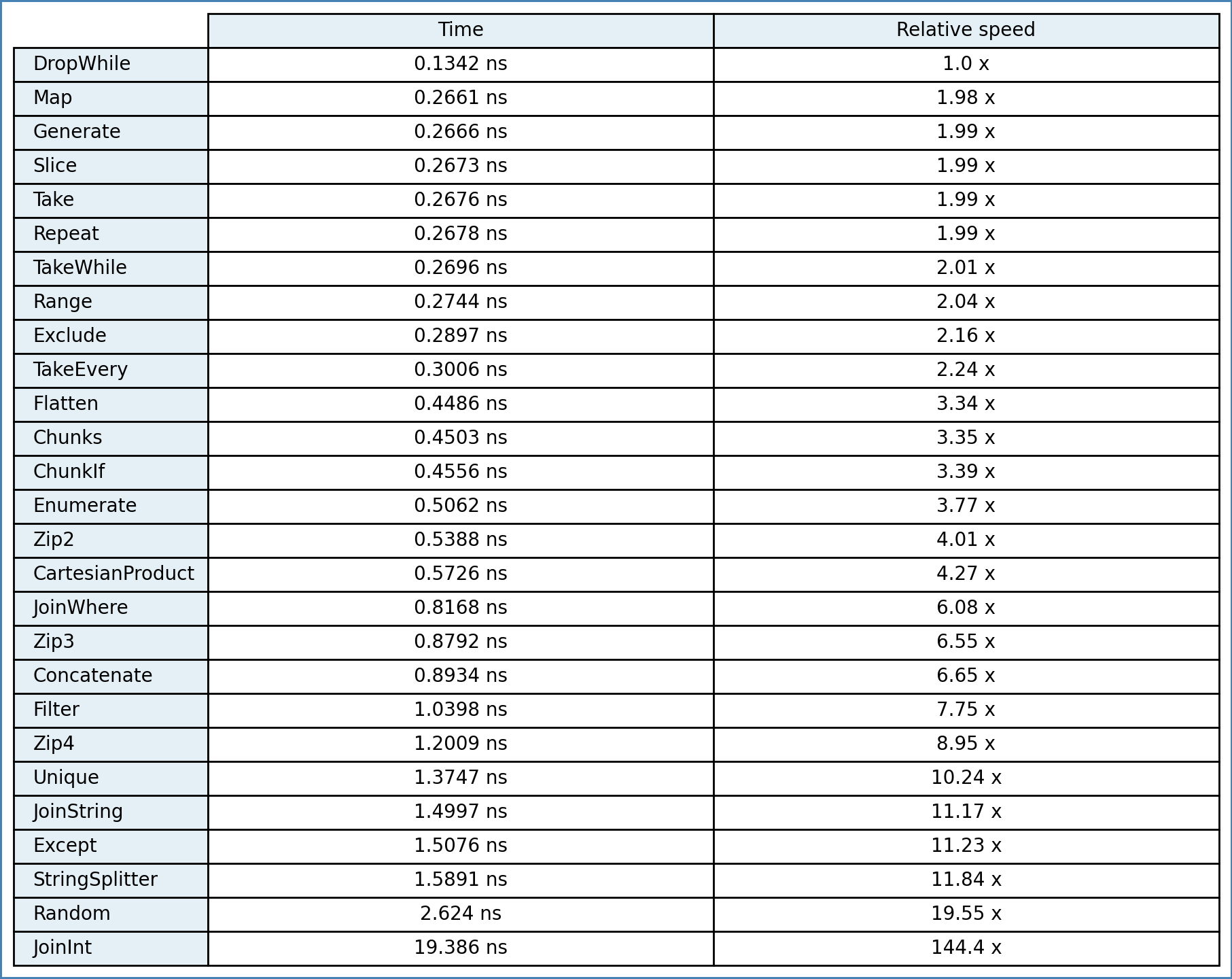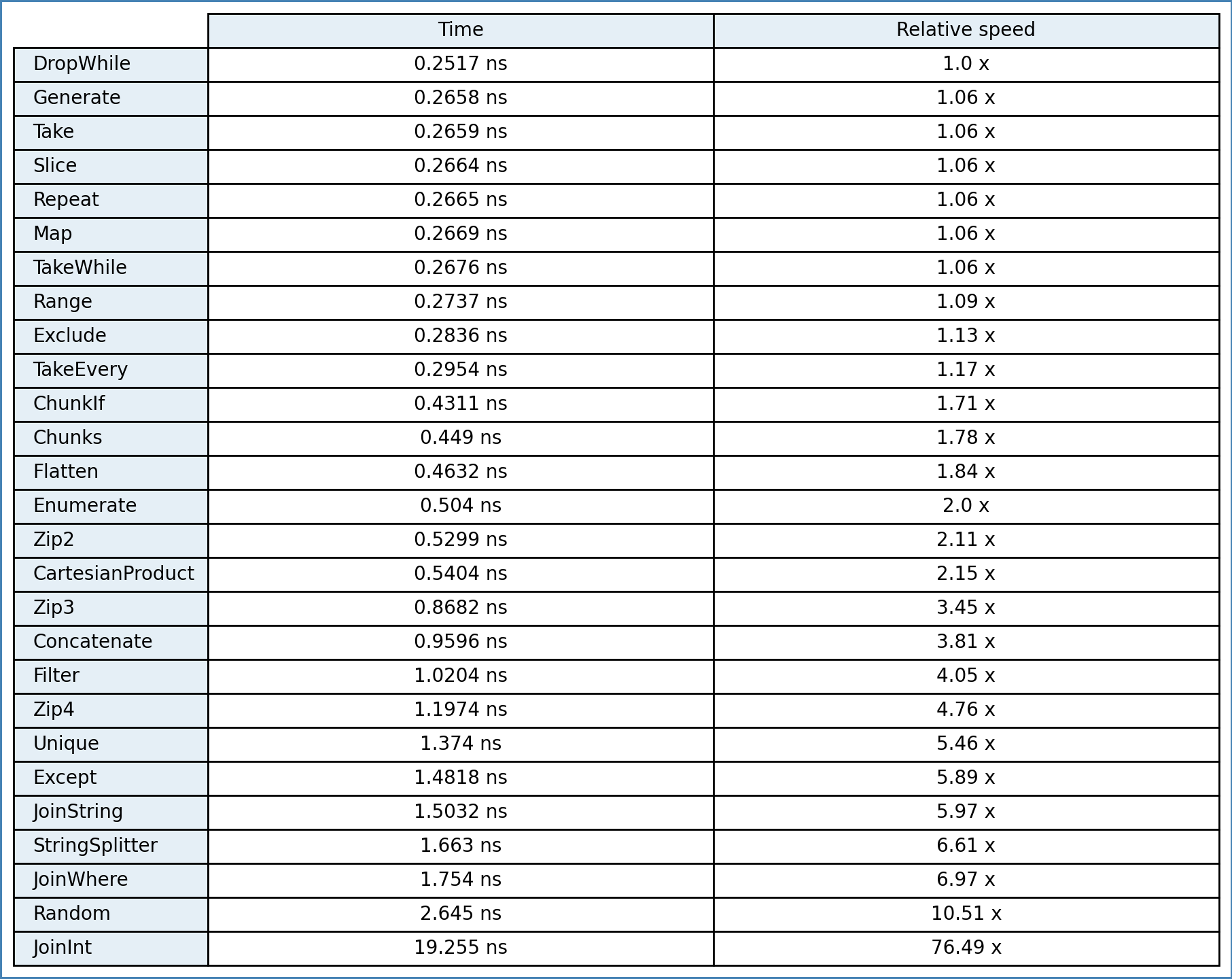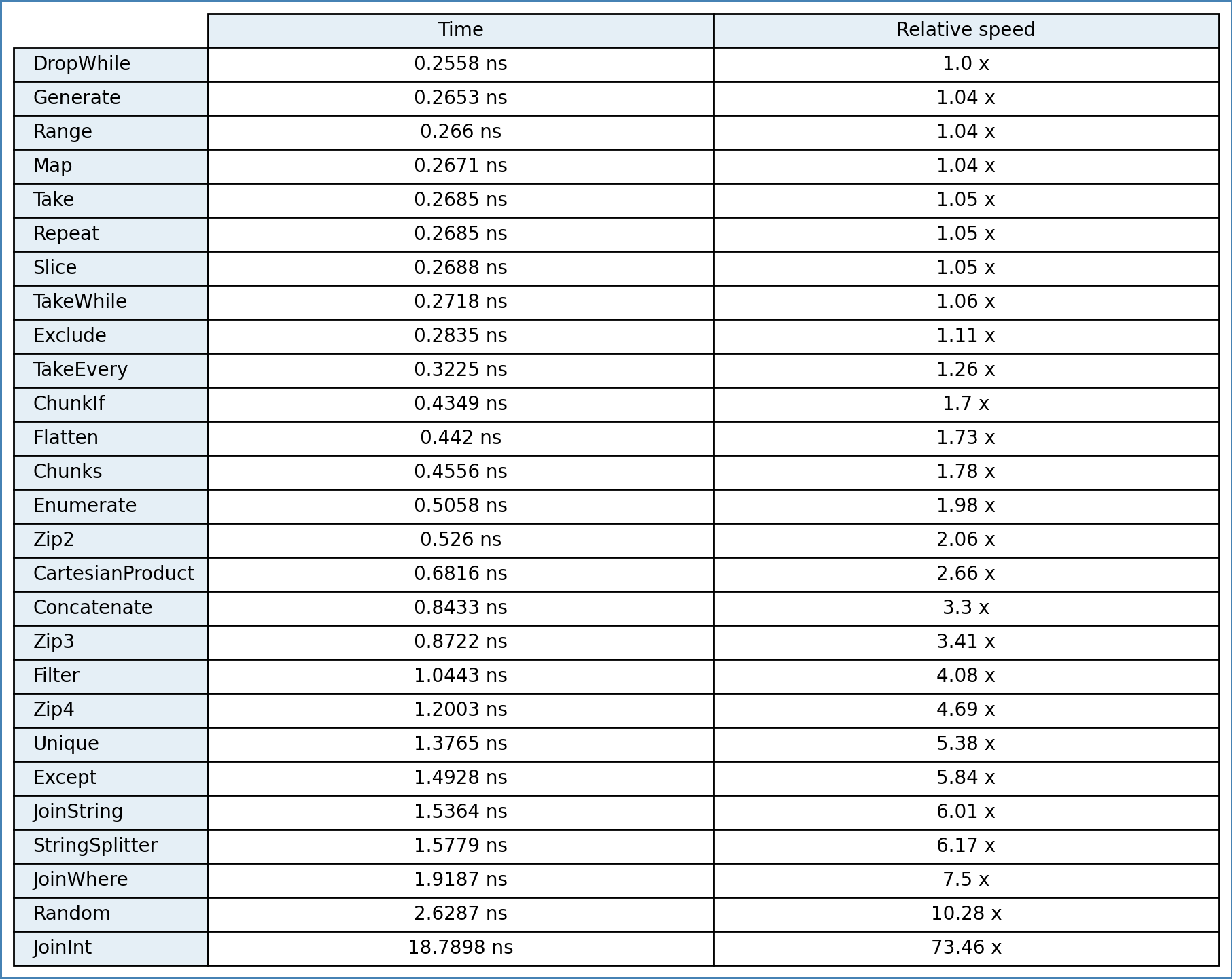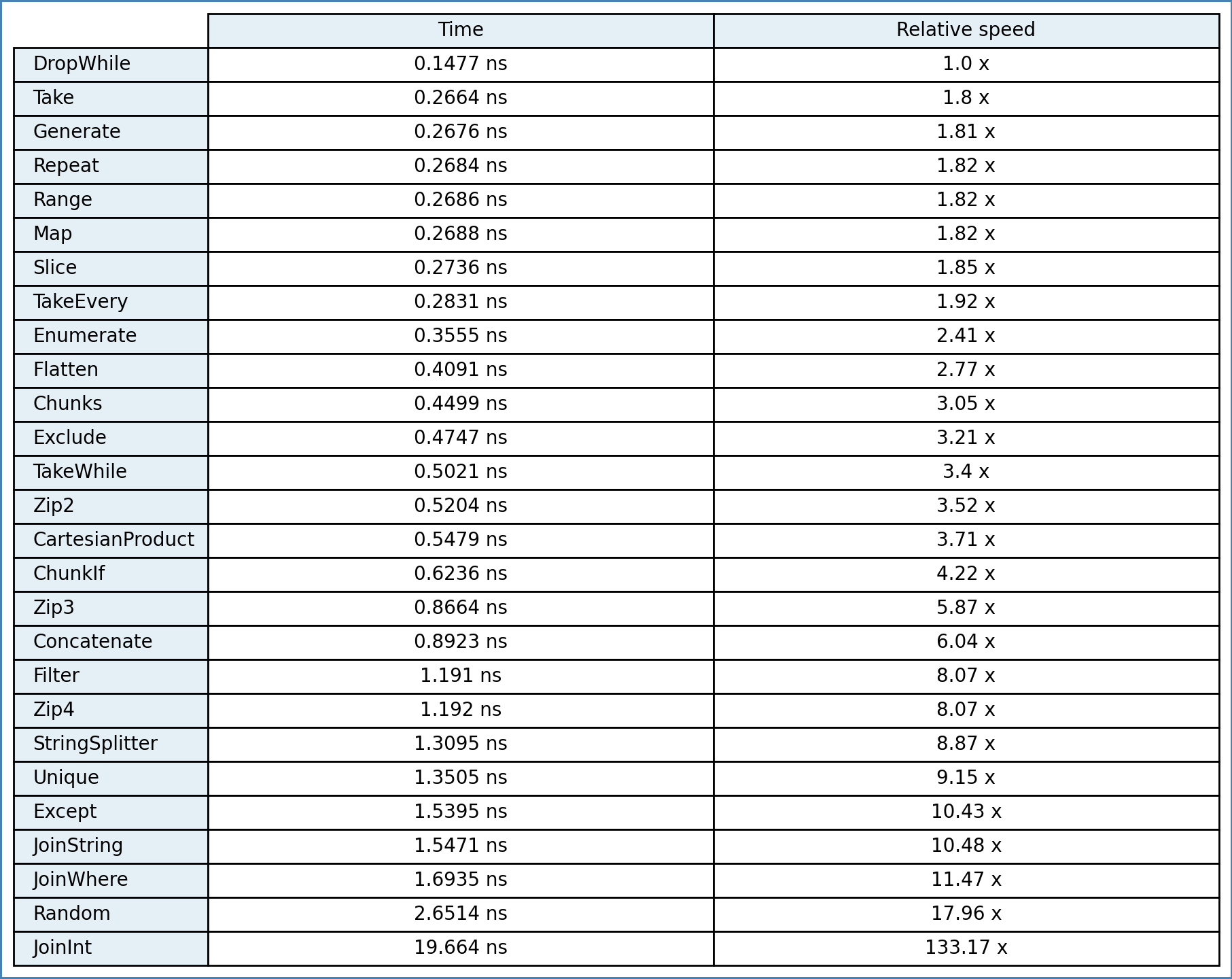Examples can be found here. Installation can be found here.
cpp-lazy is an easy and fast lazy evaluation library for C++11/14/17/20. The library tries to reduce redundant data usage for begin/end iterator pairs. Also internally this is done through template specialization for forward, bidirectional and random access iterators. For instance: lz::random_iterable::end() will return a lz::default_sentinel to prevent duplicate data that is also present in lz::random_iterable::begin(). If a 'symmetrical' end-begin iterator pair is needed, one can use lz::common or lz::common_random.
The library uses one optional dependency: the library {fmt}, more of which can be found out in the installation section. This dependency is only used for printing and formatting.
- C++11/14/17/20 compatible
- Easy printing/formatting using
lz::format,fmt::printorstd::cout - Tested with
-Wpedantic -Wextra -Wall -Wshadow -Wno-unused-function -Werror -Wconversionand/WXfor MSVC - One optional dependency (
{fmt}) - STL compatible
- Little overhead, as little as data usage possible
- Any compiler with at least C++11 support should be suitable
- Easy installation
- Clear Examples
- Piping/chaining using
|operator
Lazy evaluation is an evaluation strategy which holds the evaluation of an expression until its value is needed. In this
library, all the iterators are lazy evaluated. Suppose you want to have a sequence of n random numbers. You could
write a for loop:
std::random_device rd;
std::std::mt19937 gen(rd());
std::uniform_int_distribution dist(0, 32);
for (int i = 0; i < n; i++) {
std::cout << dist(gen); // prints a random number n times, between [0, 32]
}This is actually exactly almost identical as:
// If standalone:
std::cout << lz::random(0, 32, n);
// If with fmt:
fmt::print("{}", lz::random(0, 32, n));Both methods do not allocate any memory but the second example is a much more convenient way of writing the same thing. Now what if you wanted to do eager evaluation? Well then you could do this:
std::random_device rd;
std::std::mt19937 gen(rd());
std::uniform_int_distribution dist(0, 32);
std::vector<int> random_numbers;
std::generate(random_numbers.begin(), random_numbers.end(), [&dist, &gen]{ return dist(gen); });That is pretty verbose. Instead, try this for change:
std::vector<int> random_numbers = lz::random(0, 32, n) | lz::to<std::vector>();I want to search if the sequence of random numbers contain 6.
In 'regular' C++ code that would be:
std::random_device rd;
std::std::mt19937 gen(rd());
std::uniform_int_distribution dist(0, 32);
for (int i = 0; i < n; i++) {
if (gen(dist) == 6) {
// do something
}
}With cpp-lazy you can do this:
auto random = lz::random(0, 32, n);
if (lz::find(random, 6) != random.end()) {
// do something
}
// or
auto common = lz::common_random(0, 32, n);
if (lz::find(common, 6) != common.end()) {
// do something
}
// or (exactly the same as above)
if (std::find(common.begin(), common.end(), 6) != common.end()) {
// do something
}#include <Lz/map.hpp>
#include <vector>
int main() {
std::array<int, 4> arr = {1, 2, 3, 4};
auto result = lz::map(arr, [](int i) { return i + 1; })
| lz::to<std::vector>(); // == {2, 3, 4, 5}
// or
auto result = arr | lz::map([](int i) { return i + 1; })
| lz::to<std::vector>(); // == {2, 3, 4, 5}
// Some iterables will return sentinels, for instance (specific rules about when sentinels are returned can be found in the documentation):
std::vector<int> vec = {1, 2, 3, 4};
auto forward = lz::c_string("Hello World"); // .end() returns default_sentinel
auto inf_loop = lz::loop(vec); // .end() returns default_sentinel
auto random = lz::random(0, 32, 4); // .end() returns default_sentinel
// Some iterables are sized, if the input iterable is also sized:
auto sized = lz::map(vec, [](int i) { return i + 1; });
auto size = sized.size(); // == 4
// forward.size(); // error: forward is not sized, instead use (O(n) time): lz::eager_size(forward)
// Some iterables require the size of iterables. If the input iterable is not sized,
// the sequence will be traversed to get the size using lz::eager_size. The iterable will be documented
// appropriately if this requires a sized iterable. Example:
auto zipper1 = lz::zip(lz::c_string("ab"), lz::c_string("cd")); // Calling .end() will take O(n) time
auto zipper2 = lz::zip(sized, sized); // Takes O(1) time
// You can cache the size if you need to (more about when to do that in the appropriate iterable documentation):
auto cached_sizes = lz::zip(lz::c_string("ab") | lz::cache_size, lz::c_string("cd") | lz::cache_size); // Takes O(n) time
// However cached_sizes.end() will now take O(1) time
}lz iterables will hold a reference to the input iterable if the input iterable is not inherited from lz::lazy_view. This means that the lz iterables will hold a reference to (but not excluded to) containers such as std::vector, std::array and std::string, as they do not inherit from lz::lazy_view. This is done by the class lz::ref_or_view. This can be altered using lz::copied_iterable or lz::as_copied_iterable. This will copy the input iterable instead of holding a reference to it. This is useful for cheap to copy iterables that are not inherited from lz::lazy_view (for example boost::iterator_range).
#include <Lz/lz.hpp>
struct non_lz_iterable {
int* _begin{};
int* _end{};
non_lz_iterable(int* begin, int* end) : _begin{ begin }, _end{ end } {
}
int* begin() {
return _begin;
}
int* end() {
return _end;
}
};
int main() {
std::vector<int> vec = {1, 2, 3, 4};
// mapped will hold a reference to vec
auto mapped = lz::map(vec, [](int i) { return i + 1; });
// filtered does NOT hold a reference to mapped, but mapped still holds a reference to vec
auto filtered = lz::filter(mapped, [](int i) { return i % 2 == 0; });
auto random = lz::random(0, 32, 4);
// str will *not* hold a reference to random, because random is a lazy iterable and is trivial to copy
auto str = lz::map(random, [](int i) { return std::to_string(i); });
lz::ref_or_view<std::vector<int>> ref(vec); // Holds a reference to vec
using random_iterable = decltype(random);
lz::ref_or_view<random_iterable> ref2(random); // Does NOT hold a reference to random
non_lz_iterable non_lz(vec.data(), vec.data() + vec.size());
lz::ref_or_view<non_lz_iterable> ref(non_lz); // Holds a reference of non_lz! Watch out for this!
// Instead, if you don't want this behaviour, you can use lz::copied_iterable:
lz::copied_iterable<non_lz_iterable> copied(non_lz); // Holds a copy of non_lz = cheap to copy
// Or use the helper function:
copied = lz::as_copied_iterable(non_lz); // Holds a copy of non_lz = cheap to copy
}The library will use the STL <algorithm> functions if possible:
#include <Lz/algorithm.hpp>
#include <Lz/map.hpp>
#include <Lz/c_string.hpp>
int main() {
auto c_str = lz::c_string("Hello World");
lz::find(c_str, 'o'); // Calls lz::find, not std::find, because c_str is sentinelled
auto vec = std::vector<int>{1, 2, 3, 4};
lz::find(vec, 2); // Calls std::find, because vec is not sentinelled
}Iterating over iterables with sentinels using range-based for loops is possible. However, a workaround for C++ versions < 17 is needed.
#include <Lz/c_string.hpp>
#include <Lz/algorithm.hpp>
int main() {
auto iterable_with_sentinel = lz::c_string("Hello World");
// Possible in C++17 and higher
for (auto i : iterable_with_sentinel) {
std::cout << i; // prints "Hello World"
}
// Possible in C++11 - 14
lz::for_each(iterable_with_sentinel, [](char i) { std::cout << i; }); // prints "Hello World"
}Formatting is done using {fmt} or <format>. If neither is available, it will use std::cout/std::ostringstream:
#include <Lz/stream.hpp>
#include <Lz/filter.hpp>
#include <vector>
int main() {
std::vector<int> vec = {1, 2, 3, 4};
auto filtered = vec | lz::filter([](int i) { return i % 2 == 0; }); // == {2, 4}
// To a stream
std::cout << filtered; // prints "2 4" (only works for lz iterables)
lz::format(filtered, std::cout, ", ", "{:02d}"); // prints "02, 04" (only with {fmt} installed or C++20's <format>)
lz::format(filtered, std::cout, ", "); // prints "2, 4"
fmt::print("{}", fmt::join(filtered, ", ")); // prints "2, 4" (only with {fmt} installed)
filtered | lz::format(std::cout, ", "); // prints "2, 4"
filtered | lz::format; // prints "2, 4"
filtered | lz::format(std::cout, ", ", "{:02d}"); // prints "02, 04" (only with {fmt} installed or C++20's <format>)
}The following CMake options are available:
CPP-LAZY_USE_STANDALONE: Use the standalone version of cpp-lazy. This will not use the library{fmt}. Default isFALSECPP-LAZY_LZ_USE_MODULES(experimental): Use C++20 modules. Default isFALSECPP-LAZY_USE_INSTALLED_FMT: Use the installed version of{fmt}. This will not use the bundled version. Will usefind_package(fmt)if enabled. Default isFALSE.CPP-LAZY_DEBUG_ASSERTIONS: Enable debug assertions in other build configurations than debug (debug is always enabled). Default isFALSE.
The following way is recommended (cpp-lazy version >= 5.0.1). Note that you choose the cpp-lazy-src.zip, and not the source-code.zip/source-code.tar.gz. This prevents you from downloading stuff that you don't need, and thus preventing pollution of the cmake build directory:
# Uncomment this line to use the cpp-lazy standalone version or use -D CPP-LAZY_USE_STANDALONE=TRUE
# set(CPP-LAZY_USE_STANDALONE TRUE)
include(FetchContent)
FetchContent_Declare(cpp-lazy
URL https://github.com/MarcDirven/cpp-lazy/releases/download/<TAG_HERE E.G. v9.0.0>/cpp-lazy-src.zip
# Below is optional
# URL_MD5 <MD5 HASH OF cpp-lazy-src.zip>
# If using CMake >= 3.24, preferably set <bool> to TRUE
# DOWNLOAD_EXTRACT_TIMESTAMP <bool>
)
FetchContent_MakeAvailable(cpp-lazy)
add_executable(${PROJECT_NAME} main.cpp)
target_link_libraries(${PROJECT_NAME} cpp-lazy::cpp-lazy)An alternative ('less' recommended), add to your CMakeLists.txt the following:
# Uncomment this line to use the cpp-lazy standalone version
# set(CPP-LAZY_USE_STANDALONE TRUE)
include(FetchContent)
FetchContent_Declare(cpp-lazy
GIT_REPOSITORY https://github.com/MarcDirven/cpp-lazy
GIT_TAG ... # Commit hash
# If using CMake >= 3.24, preferably set <bool> to TRUE
# DOWNLOAD_EXTRACT_TIMESTAMP <bool>
)
FetchContent_MakeAvailable(cpp-lazy)
add_executable(${PROJECT_NAME} main.cpp)
target_link_libraries(${PROJECT_NAME} cpp-lazy::cpp-lazy)Everything higher than version 7.0.2 is supported. Please note that version 9.0.0 has drastic changes in the API (PascalCase/camelCase -> snake_case).
add_requires("cpp-lazy >=9.0.0")
target("test")
add_packages("cpp-lazy")- Clone the repository
- Specify the include directory to
cpp-lazy/include. - Include files as follows:
// Important, preprocessor macro 'LZ_STANDALONE' has to be defined already
// or
// #define LZ_STANDALONE
#include <Lz/map.hpp>
#include <vector>
int main() {
std::array<int, 4> arr = {1, 2, 3, 4};
auto result = lz::map(arr, [](int i) { return i + 1; }) | lz::to<std::vector>(); // == {2, 3, 4, 5}
// or
auto result = lz::to<std::vector>(arr | lz::map([](int i) { return i + 1; })); // == {2, 3, 4, 5}
}- Clone the repository
- Specify the include directory to
cpp-lazy/includeandfmt/include. - Define
FMT_HEADER_ONLYbefore including anylzfiles. - Include files as follows:
#define FMT_HEADER_ONLY
#include <Lz/map.hpp>
#include <vector>
int main() {
std::array<int, 4> arr = {1, 2, 3, 4};
auto result = lz::map(arr, [](int i) { return i + 1; }) | lz::to<std::vector>(); // == {2, 3, 4, 5}
// or
auto result = lz::to<std::vector>(arr | lz::map([](int i) { return i + 1; })); // == {2, 3, 4, 5}
}Clone the repository using git clone https://github.com/MarcDirven/cpp-lazy/ and add to CMakeLists.txt the following:
add_subdirectory(cpp-lazy)
add_executable(${PROJECT_NAME} main.cpp)
target_link_libraries(${PROJECT_NAME} cpp-lazy::cpp-lazy)The time is equal to one iteration. One iteration includes the creation of the iterable and one iteration of that iterable. Compiled with: gcc version 11.4.0 (Ubuntu 11.4.0-1ubuntu1~22.04).
C++11
C++14
C++17
C++20





